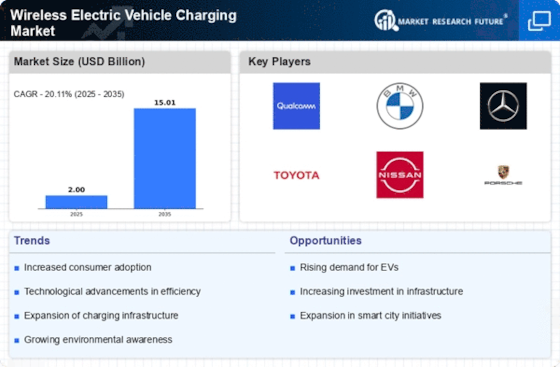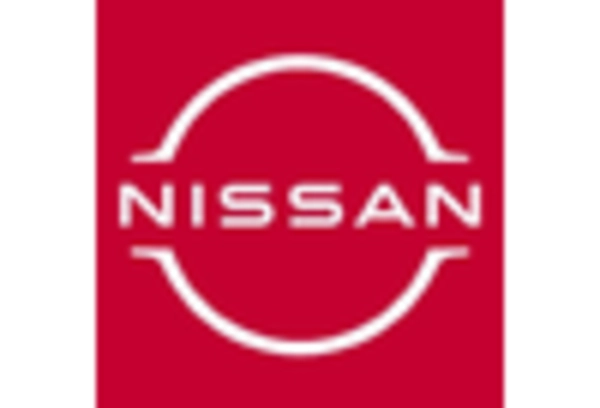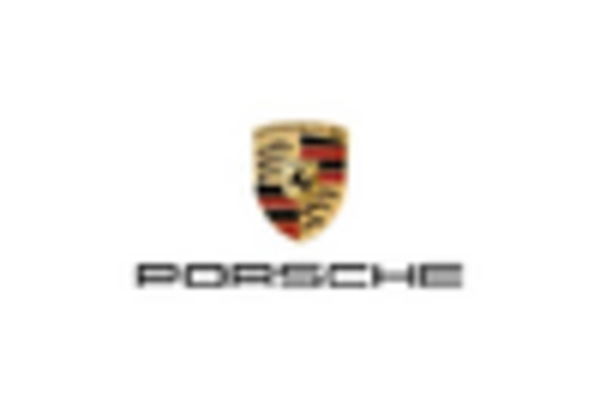Inductive Charging
Resonant Inductive Charging
Magnetic Field Charging
Home Charging Stations
Public Charging Stations
Commercial Charging Stations
Individual Consumers
Fleet Operators
Government and Municipalities
Passenger Vehicles
Light Commercial Vehicles
Heavy Commercial Vehicles
North America
Europe
South America
Asia Pacific
Middle East and Africa
North America Outlook (USD Billion, 2019-2035)
North America Wireless Electric Vehicle Charging Market by Technology Type
Inductive Charging
Resonant Inductive Charging
Magnetic Field Charging
North America Wireless Electric Vehicle Charging Market by Charging Infrastructure Type
Home Charging Stations
Public Charging Stations
Commercial Charging Stations
North America Wireless Electric Vehicle Charging Market by End User Type
Individual Consumers
Fleet Operators
Government and Municipalities
North America Wireless Electric Vehicle Charging Market by Vehicle Type
Passenger Vehicles
Light Commercial Vehicles
Heavy Commercial Vehicles
North America Wireless Electric Vehicle Charging Market by Regional Type
US
Canada
US Outlook (USD Billion, 2019-2035)
US Wireless Electric Vehicle Charging Market by Technology Type
Inductive Charging
Resonant Inductive Charging
Magnetic Field Charging
US Wireless Electric Vehicle Charging Market by Charging Infrastructure Type
Home Charging Stations
Public Charging Stations
Commercial Charging Stations
US Wireless Electric Vehicle Charging Market by End User Type
Individual Consumers
Fleet Operators
Government and Municipalities
US Wireless Electric Vehicle Charging Market by Vehicle Type
Passenger Vehicles
Light Commercial Vehicles
Heavy Commercial Vehicles
CANADA Outlook (USD Billion, 2019-2035)
CANADA Wireless Electric Vehicle Charging Market by Technology Type
Inductive Charging
Resonant Inductive Charging
Magnetic Field Charging
CANADA Wireless Electric Vehicle Charging Market by Charging Infrastructure Type
Home Charging Stations
Public Charging Stations
Commercial Charging Stations
CANADA Wireless Electric Vehicle Charging Market by End User Type
Individual Consumers
Fleet Operators
Government and Municipalities
CANADA Wireless Electric Vehicle Charging Market by Vehicle Type
Passenger Vehicles
Light Commercial Vehicles
Heavy Commercial Vehicles
Europe Outlook (USD Billion, 2019-2035)
Europe Wireless Electric Vehicle Charging Market by Technology Type
Inductive Charging
Resonant Inductive Charging
Magnetic Field Charging
Europe Wireless Electric Vehicle Charging Market by Charging Infrastructure Type
Home Charging Stations
Public Charging Stations
Commercial Charging Stations
Europe Wireless Electric Vehicle Charging Market by End User Type
Individual Consumers
Fleet Operators
Government and Municipalities
Europe Wireless Electric Vehicle Charging Market by Vehicle Type
Passenger Vehicles
Light Commercial Vehicles
Heavy Commercial Vehicles
Europe Wireless Electric Vehicle Charging Market by Regional Type
Germany
UK
France
Russia
Italy
Spain
Rest of Europe
GERMANY Outlook (USD Billion, 2019-2035)
GERMANY Wireless Electric Vehicle Charging Market by Technology Type
Inductive Charging
Resonant Inductive Charging
Magnetic Field Charging
GERMANY Wireless Electric Vehicle Charging Market by Charging Infrastructure Type
Home Charging Stations
Public Charging Stations
Commercial Charging Stations
GERMANY Wireless Electric Vehicle Charging Market by End User Type
Individual Consumers
Fleet Operators
Government and Municipalities
GERMANY Wireless Electric Vehicle Charging Market by Vehicle Type
Passenger Vehicles
Light Commercial Vehicles
Heavy Commercial Vehicles
UK Outlook (USD Billion, 2019-2035)
UK Wireless Electric Vehicle Charging Market by Technology Type
Inductive Charging
Resonant Inductive Charging
Magnetic Field Charging
UK Wireless Electric Vehicle Charging Market by Charging Infrastructure Type
Home Charging Stations
Public Charging Stations
Commercial Charging Stations
UK Wireless Electric Vehicle Charging Market by End User Type
Individual Consumers
Fleet Operators
Government and Municipalities
UK Wireless Electric Vehicle Charging Market by Vehicle Type
Passenger Vehicles
Light Commercial Vehicles
Heavy Commercial Vehicles
FRANCE Outlook (USD Billion, 2019-2035)
FRANCE Wireless Electric Vehicle Charging Market by Technology Type
Inductive Charging
Resonant Inductive Charging
Magnetic Field Charging
FRANCE Wireless Electric Vehicle Charging Market by Charging Infrastructure Type
Home Charging Stations
Public Charging Stations
Commercial Charging Stations
FRANCE Wireless Electric Vehicle Charging Market by End User Type
Individual Consumers
Fleet Operators
Government and Municipalities
FRANCE Wireless Electric Vehicle Charging Market by Vehicle Type
Passenger Vehicles
Light Commercial Vehicles
Heavy Commercial Vehicles
RUSSIA Outlook (USD Billion, 2019-2035)
RUSSIA Wireless Electric Vehicle Charging Market by Technology Type
Inductive Charging
Resonant Inductive Charging
Magnetic Field Charging
RUSSIA Wireless Electric Vehicle Charging Market by Charging Infrastructure Type
Home Charging Stations
Public Charging Stations
Commercial Charging Stations
RUSSIA Wireless Electric Vehicle Charging Market by End User Type
Individual Consumers
Fleet Operators
Government and Municipalities
RUSSIA Wireless Electric Vehicle Charging Market by Vehicle Type
Passenger Vehicles
Light Commercial Vehicles
Heavy Commercial Vehicles
ITALY Outlook (USD Billion, 2019-2035)
ITALY Wireless Electric Vehicle Charging Market by Technology Type
Inductive Charging
Resonant Inductive Charging
Magnetic Field Charging
ITALY Wireless Electric Vehicle Charging Market by Charging Infrastructure Type
Home Charging Stations
Public Charging Stations
Commercial Charging Stations
ITALY Wireless Electric Vehicle Charging Market by End User Type
Individual Consumers
Fleet Operators
Government and Municipalities
ITALY Wireless Electric Vehicle Charging Market by Vehicle Type
Passenger Vehicles
Light Commercial Vehicles
Heavy Commercial Vehicles
SPAIN Outlook (USD Billion, 2019-2035)
SPAIN Wireless Electric Vehicle Charging Market by Technology Type
Inductive Charging
Resonant Inductive Charging
Magnetic Field Charging
SPAIN Wireless Electric Vehicle Charging Market by Charging Infrastructure Type
Home Charging Stations
Public Charging Stations
Commercial Charging Stations
SPAIN Wireless Electric Vehicle Charging Market by End User Type
Individual Consumers
Fleet Operators
Government and Municipalities
SPAIN Wireless Electric Vehicle Charging Market by Vehicle Type
Passenger Vehicles
Light Commercial Vehicles
Heavy Commercial Vehicles
REST OF EUROPE Outlook (USD Billion, 2019-2035)
REST OF EUROPE Wireless Electric Vehicle Charging Market by Technology Type
Inductive Charging
Resonant Inductive Charging
Magnetic Field Charging
REST OF EUROPE Wireless Electric Vehicle Charging Market by Charging Infrastructure Type
Home Charging Stations
Public Charging Stations
Commercial Charging Stations
REST OF EUROPE Wireless Electric Vehicle Charging Market by End User Type
Individual Consumers
Fleet Operators
Government and Municipalities
REST OF EUROPE Wireless Electric Vehicle Charging Market by Vehicle Type
Passenger Vehicles
Light Commercial Vehicles
Heavy Commercial Vehicles
APAC Outlook (USD Billion, 2019-2035)
APAC Wireless Electric Vehicle Charging Market by Technology Type
Inductive Charging
Resonant Inductive Charging
Magnetic Field Charging
APAC Wireless Electric Vehicle Charging Market by Charging Infrastructure Type
Home Charging Stations
Public Charging Stations
Commercial Charging Stations
APAC Wireless Electric Vehicle Charging Market by End User Type
Individual Consumers
Fleet Operators
Government and Municipalities
APAC Wireless Electric Vehicle Charging Market by Vehicle Type
Passenger Vehicles
Light Commercial Vehicles
Heavy Commercial Vehicles
APAC Wireless Electric Vehicle Charging Market by Regional Type
China
India
Japan
South Korea
Malaysia
Thailand
Indonesia
Rest of APAC
CHINA Outlook (USD Billion, 2019-2035)
CHINA Wireless Electric Vehicle Charging Market by Technology Type
Inductive Charging
Resonant Inductive Charging
Magnetic Field Charging
CHINA Wireless Electric Vehicle Charging Market by Charging Infrastructure Type
Home Charging Stations
Public Charging Stations
Commercial Charging Stations
CHINA Wireless Electric Vehicle Charging Market by End User Type
Individual Consumers
Fleet Operators
Government and Municipalities
CHINA Wireless Electric Vehicle Charging Market by Vehicle Type
Passenger Vehicles
Light Commercial Vehicles
Heavy Commercial Vehicles
INDIA Outlook (USD Billion, 2019-2035)
INDIA Wireless Electric Vehicle Charging Market by Technology Type
Inductive Charging
Resonant Inductive Charging
Magnetic Field Charging
INDIA Wireless Electric Vehicle Charging Market by Charging Infrastructure Type
Home Charging Stations
Public Charging Stations
Commercial Charging Stations
INDIA Wireless Electric Vehicle Charging Market by End User Type
Individual Consumers
Fleet Operators
Government and Municipalities
INDIA Wireless Electric Vehicle Charging Market by Vehicle Type
Passenger Vehicles
Light Commercial Vehicles
Heavy Commercial Vehicles
JAPAN Outlook (USD Billion, 2019-2035)
JAPAN Wireless Electric Vehicle Charging Market by Technology Type
Inductive Charging
Resonant Inductive Charging
Magnetic Field Charging
JAPAN Wireless Electric Vehicle Charging Market by Charging Infrastructure Type
Home Charging Stations
Public Charging Stations
Commercial Charging Stations
JAPAN Wireless Electric Vehicle Charging Market by End User Type
Individual Consumers
Fleet Operators
Government and Municipalities
JAPAN Wireless Electric Vehicle Charging Market by Vehicle Type
Passenger Vehicles
Light Commercial Vehicles
Heavy Commercial Vehicles
SOUTH KOREA Outlook (USD Billion, 2019-2035)
SOUTH KOREA Wireless Electric Vehicle Charging Market by Technology Type
Inductive Charging
Resonant Inductive Charging
Magnetic Field Charging
SOUTH KOREA Wireless Electric Vehicle Charging Market by Charging Infrastructure Type
Home Charging Stations
Public Charging Stations
Commercial Charging Stations
SOUTH KOREA Wireless Electric Vehicle Charging Market by End User Type
Individual Consumers
Fleet Operators
Government and Municipalities
SOUTH KOREA Wireless Electric Vehicle Charging Market by Vehicle Type
Passenger Vehicles
Light Commercial Vehicles
Heavy Commercial Vehicles
MALAYSIA Outlook (USD Billion, 2019-2035)
MALAYSIA Wireless Electric Vehicle Charging Market by Technology Type
Inductive Charging
Resonant Inductive Charging
Magnetic Field Charging
MALAYSIA Wireless Electric Vehicle Charging Market by Charging Infrastructure Type
Home Charging Stations
Public Charging Stations
Commercial Charging Stations
MALAYSIA Wireless Electric Vehicle Charging Market by End User Type
Individual Consumers
Fleet Operators
Government and Municipalities
MALAYSIA Wireless Electric Vehicle Charging Market by Vehicle Type
Passenger Vehicles
Light Commercial Vehicles
Heavy Commercial Vehicles
THAILAND Outlook (USD Billion, 2019-2035)
THAILAND Wireless Electric Vehicle Charging Market by Technology Type
Inductive Charging
Resonant Inductive Charging
Magnetic Field Charging
THAILAND Wireless Electric Vehicle Charging Market by Charging Infrastructure Type
Home Charging Stations
Public Charging Stations
Commercial Charging Stations
THAILAND Wireless Electric Vehicle Charging Market by End User Type
Individual Consumers
Fleet Operators
Government and Municipalities
THAILAND Wireless Electric Vehicle Charging Market by Vehicle Type
Passenger Vehicles
Light Commercial Vehicles
Heavy Commercial Vehicles
INDONESIA Outlook (USD Billion, 2019-2035)
INDONESIA Wireless Electric Vehicle Charging Market by Technology Type
Inductive Charging
Resonant Inductive Charging
Magnetic Field Charging
INDONESIA Wireless Electric Vehicle Charging Market by Charging Infrastructure Type
Home Charging Stations
Public Charging Stations
Commercial Charging Stations
INDONESIA Wireless Electric Vehicle Charging Market by End User Type
Individual Consumers
Fleet Operators
Government and Municipalities
INDONESIA Wireless Electric Vehicle Charging Market by Vehicle Type
Passenger Vehicles
Light Commercial Vehicles
Heavy Commercial Vehicles
REST OF APAC Outlook (USD Billion, 2019-2035)
REST OF APAC Wireless Electric Vehicle Charging Market by Technology Type
Inductive Charging
Resonant Inductive Charging
Magnetic Field Charging
REST OF APAC Wireless Electric Vehicle Charging Market by Charging Infrastructure Type
Home Charging Stations
Public Charging Stations
Commercial Charging Stations
REST OF APAC Wireless Electric Vehicle Charging Market by End User Type
Individual Consumers
Fleet Operators
Government and Municipalities
REST OF APAC Wireless Electric Vehicle Charging Market by Vehicle Type
Passenger Vehicles
Light Commercial Vehicles
Heavy Commercial Vehicles
South America Outlook (USD Billion, 2019-2035)
South America Wireless Electric Vehicle Charging Market by Technology Type
Inductive Charging
Resonant Inductive Charging
Magnetic Field Charging
South America Wireless Electric Vehicle Charging Market by Charging Infrastructure Type
Home Charging Stations
Public Charging Stations
Commercial Charging Stations
South America Wireless Electric Vehicle Charging Market by End User Type
Individual Consumers
Fleet Operators
Government and Municipalities
South America Wireless Electric Vehicle Charging Market by Vehicle Type
Passenger Vehicles
Light Commercial Vehicles
Heavy Commercial Vehicles
South America Wireless Electric Vehicle Charging Market by Regional Type
Brazil
Mexico
Argentina
Rest of South America
BRAZIL Outlook (USD Billion, 2019-2035)
BRAZIL Wireless Electric Vehicle Charging Market by Technology Type
Inductive Charging
Resonant Inductive Charging
Magnetic Field Charging
BRAZIL Wireless Electric Vehicle Charging Market by Charging Infrastructure Type
Home Charging Stations
Public Charging Stations
Commercial Charging Stations
BRAZIL Wireless Electric Vehicle Charging Market by End User Type
Individual Consumers
Fleet Operators
Government and Municipalities
BRAZIL Wireless Electric Vehicle Charging Market by Vehicle Type
Passenger Vehicles
Light Commercial Vehicles
Heavy Commercial Vehicles
MEXICO Outlook (USD Billion, 2019-2035)
MEXICO Wireless Electric Vehicle Charging Market by Technology Type
Inductive Charging
Resonant Inductive Charging
Magnetic Field Charging
MEXICO Wireless Electric Vehicle Charging Market by Charging Infrastructure Type
Home Charging Stations
Public Charging Stations
Commercial Charging Stations
MEXICO Wireless Electric Vehicle Charging Market by End User Type
Individual Consumers
Fleet Operators
Government and Municipalities
MEXICO Wireless Electric Vehicle Charging Market by Vehicle Type
Passenger Vehicles
Light Commercial Vehicles
Heavy Commercial Vehicles
ARGENTINA Outlook (USD Billion, 2019-2035)
ARGENTINA Wireless Electric Vehicle Charging Market by Technology Type
Inductive Charging
Resonant Inductive Charging
Magnetic Field Charging
ARGENTINA Wireless Electric Vehicle Charging Market by Charging Infrastructure Type
Home Charging Stations
Public Charging Stations
Commercial Charging Stations
ARGENTINA Wireless Electric Vehicle Charging Market by End User Type
Individual Consumers
Fleet Operators
Government and Municipalities
ARGENTINA Wireless Electric Vehicle Charging Market by Vehicle Type
Passenger Vehicles
Light Commercial Vehicles
Heavy Commercial Vehicles
REST OF SOUTH AMERICA Outlook (USD Billion, 2019-2035)
REST OF SOUTH AMERICA Wireless Electric Vehicle Charging Market by Technology Type
Inductive Charging
Resonant Inductive Charging
Magnetic Field Charging
REST OF SOUTH AMERICA Wireless Electric Vehicle Charging Market by Charging Infrastructure Type
Home Charging Stations
Public Charging Stations
Commercial Charging Stations
REST OF SOUTH AMERICA Wireless Electric Vehicle Charging Market by End User Type
Individual Consumers
Fleet Operators
Government and Municipalities
REST OF SOUTH AMERICA Wireless Electric Vehicle Charging Market by Vehicle Type
Passenger Vehicles
Light Commercial Vehicles
Heavy Commercial Vehicles
MEA Outlook (USD Billion, 2019-2035)
MEA Wireless Electric Vehicle Charging Market by Technology Type
Inductive Charging
Resonant Inductive Charging
Magnetic Field Charging
MEA Wireless Electric Vehicle Charging Market by Charging Infrastructure Type
Home Charging Stations
Public Charging Stations
Commercial Charging Stations
MEA Wireless Electric Vehicle Charging Market by End User Type
Individual Consumers
Fleet Operators
Government and Municipalities
MEA Wireless Electric Vehicle Charging Market by Vehicle Type
Passenger Vehicles
Light Commercial Vehicles
Heavy Commercial Vehicles
MEA Wireless Electric Vehicle Charging Market by Regional Type
GCC Countries
South Africa
Rest of MEA
GCC COUNTRIES Outlook (USD Billion, 2019-2035)
GCC COUNTRIES Wireless Electric Vehicle Charging Market by Technology Type
Inductive Charging
Resonant Inductive Charging
Magnetic Field Charging
GCC COUNTRIES Wireless Electric Vehicle Charging Market by Charging Infrastructure Type
Home Charging Stations
Public Charging Stations
Commercial Charging Stations
GCC COUNTRIES Wireless Electric Vehicle Charging Market by End User Type
Individual Consumers
Fleet Operators
Government and Municipalities
GCC COUNTRIES Wireless Electric Vehicle Charging Market by Vehicle Type
Passenger Vehicles
Light Commercial Vehicles
Heavy Commercial Vehicles
SOUTH AFRICA Outlook (USD Billion, 2019-2035)
SOUTH AFRICA Wireless Electric Vehicle Charging Market by Technology Type
Inductive Charging
Resonant Inductive Charging
Magnetic Field Charging
SOUTH AFRICA Wireless Electric Vehicle Charging Market by Charging Infrastructure Type
Home Charging Stations
Public Charging Stations
Commercial Charging Stations
SOUTH AFRICA Wireless Electric Vehicle Charging Market by End User Type
Individual Consumers
Fleet Operators
Government and Municipalities
SOUTH AFRICA Wireless Electric Vehicle Charging Market by Vehicle Type
Passenger Vehicles
Light Commercial Vehicles
Heavy Commercial Vehicles
REST OF MEA Outlook (USD Billion, 2019-2035)
REST OF MEA Wireless Electric Vehicle Charging Market by Technology Type
Inductive Charging
Resonant Inductive Charging
Magnetic Field Charging
REST OF MEA Wireless Electric Vehicle Charging Market by Charging Infrastructure Type
Home Charging Stations
Public Charging Stations
Commercial Charging Stations
REST OF MEA Wireless Electric Vehicle Charging Market by End User Type
Individual Consumers
Fleet Operators
Government and Municipalities
REST OF MEA Wireless Electric Vehicle Charging Market by Vehicle Type
Passenger Vehicles
Light Commercial Vehicles
Heavy Commercial Vehicles


















Leave a Comment